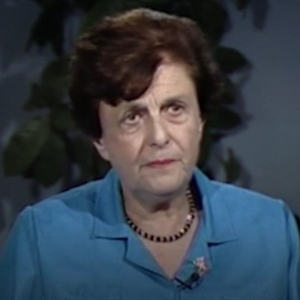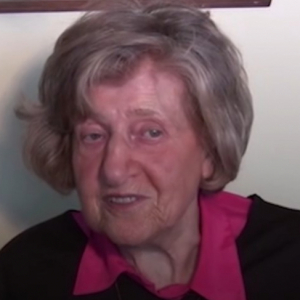Tania Siegel
Tania Siegel discusses the challenges and struggles of life with the partisans.
Tania was born on May 23, 1923 in Jody, Poland (modern day Belarus) to Alter Silberman and Basha Smuszkowicz. She had two brothers, Jack who was two years older and Peter who was two years younger. Before the war, Tania’s family was successful business owners as her parents had a mill in Jody and mills in two other towns. As Tania and her family lived in Eastern Poland, they first experienced occupation by the Soviet Union in 1939. The Soviets confiscated the mill in Jody from Tania’s family. Tania’s mother passed away before the German invasion in 1941.
After previous hiding arrangements failed, Tania walked towards the Szarkowszczyzna ghetto in December 1941. Around December 20, Tania was desperate for food and begged a farmer to stay on his family’s farm. Mitrofan Siedziukiewicz was the farmer and he encouraged Tania to stay in the farmhouse as the Nazis would kill her if she continued to ghetto. Her brother, Peter searched to see if he could find where she was hiding. He found the Siedziukiewicz farm and Mitrofan offered to protect the family. The Siedziukiewicz family also protected Tania’s aunt and and at one point eight people were hiding on the farm. In the spring 1943, the Silbermans had to flee after the police became aware of their presence in the area.
The family fled into the Platorova forest on the Polish border with Russia. In the Russian partisan group, Spartak, Tania worked as a nurse. Spartak taught her how to place mines on railroad tracks. Tania and other Jewish girls in Spartak often feared that they would face sexual assault. Tania and her family were liberated liberated by Soviet troops in 1944.
After liberation Tania worked as a bank teller in Szarkowsczyna. In 1946, she travelled and eventually reached the displaced persons camp in Pocking, Germany. Tania married on December 21, 1946 and had her first child in 1947. While they initially intended to go to Israel, Tania and her family changed their mind after hearing about the hostilities in the region and poor living conditions. Tania and her husband immigrated to Canada during February of 1949. They lived in Toronto and later had two daughters.
Tania Siegel’s full testimony is part of the Canadian Collection of Holocaust survivor testimonies. It is preserved in the USC Shoah Foundation’s Visual History Archive and accessible through the Ekstein Library.
Tania SiegelFor girls especially, it was hard.
Testimony to discover
-
Liberation

Elly Gotz
Elly Gotz recalls being liberated by the American army at the Dachau Concentration Camp.
Listen -
Post-War Conditions

Vera Schiff
Vera Schiff discusses life in Prague in the immediate aftermath of the Holocaust and the realization that she was the sole survivor of her family.
Listen -
Hiding

Robert Rusinek
Robert Rusinek describes being hidden in Catholic orphanages during the Holocaust and its effect on his identity.
Listen -
Physical Resistance

Sara Ginaite- Rubinson
Sara Ginaite-Rubinson discusses her motivations for joining the partisans as well as daily life and conditions in her unit.
Listen
Educators & Students
Educational guides
Check resources